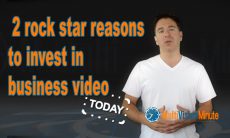30 years is a long time. If I didn’t know better, I’d suspect that I was getting old. A few months ago, I wrote about my experience taking a couple of my kids to “Take Your Child to Work Day” in April, and while walking through the IBM cafeteria for the first time in quite a while, I suddenly asked myself, “What’s a Model 168 doing here?” It took a second for me to realize that it was a museum piece. A relic from a time long ago and far away. But it’s also the first computer I worked on 30 years ago when I started at IBM.
While I regaled my kids with stories about how different computers were back then, I was sure I sounded like my dad telling me about what it was like for him long ago. It always sounded to me like “A car cost a nickel, a house cost a quarter…” and I am sure that my kids were rolling their eyes again when they heard how they have more memory in their cell phones than a whole roomful of computers had back when I was starting out.
So, it really was a long time ago.
I started working for IBM while I was still in college, and IBM paid my tuition. I worked the midnight shift, going to school during the day. I was studying Accounting, but I didn’t really feel it was my calling. My job at IBM had lots of slack time, so with all these computers around, I just started to write programs for them. I spent more than a decade as a programmer, including a couple of stints in IBM Research, but I never lost my taste for business. After a few failed products—they were good technology but did not sell—I decided to go back to school for marketing, which IBM also paid for.
I really found my niche when I came to ibm.com. I spent eight years there, ostensibly in technical and management jobs, but I got to work on a lot of marketing problems. Because the Web was so new, no one really knew what to do, so if some geek thought he had a good marketing idea, sometimes the marketers went along. It was at ibm.com that I began working with Bill Hunt on IBM’s first search marketing campaigns, which resulted on our book together. It was also there that we all learned to “do it wrong quickly,” because experimentation was the only way to find out what worked. It still is.
Along the way, IBM named me a Distinguished Engineer, which is an executive level technical position. But I have to admit that the last few years, I’ve been a lot more passionate about marketing than technology, and my wife Linda teases me that I am becoming an Extinguished Engineer. I still enjoy working in technology, but I’m more likely to be interested in what a business can get from that technology than how it works. Luckily for me, my bosses at IBM put up with me writing and speaking about marketing on top of my day job.
Now honestly, I’ve had many times where working for IBM was a struggle, but I suspect any job is like that. More often, I felt blessed to be working with such a high caliber of people and to have a chance to work on things I really enjoy every day. I am especially blessed by the way IBM has taken care of my family.
Some of you know that I have four kids, and I love David, Madeline, Marcella, and Dwight dearly. But David, the oldest, is a special case (as in “special education”), because he has Down syndrome. When you take a child with Down syndrome home from the hospital, they give you lots of little brochures about what to expect. (See, for some kids, the parents do get an owner’s manual.) Those pamphlets had lots of sobering statistics about Dave being nine times more likely to contract leukemia, among other afflictions. So, I’ve always felt blessed that Dave is covered under IBM’s benefits, which has paid for all of his health care costs, and also covered extras not covered by most companies, such as physical therapy. We’ve been extremely lucky that David has been as healthy as he he has been, but such is the state of my country that hanging onto health care benefits often means hanging onto a job.
So, part of the reason that I have worked for IBM all these years is those great benefits. And it’s also the reason that I’ll be retiring from IBM on September 1, because IBM graciously covers retirees, their spouses, and their disabled children with medical care for life. So, even after I retire, IBM will still be taking care of my family and me—IBM will be taking care of Dave even after my wife and I are gone.
So, we’ve got health care taken care of, but my family has this nasty habit of eating, so they’ve gently suggested to me that I might want to keep bringing home a paycheck after I “retire.” I hope to be able to make a living from writing, public speaking, and consulting. (I’ll also do weddings and bar mitzvahs if need be.) But even though I am looking forward to freelancing, after all these years working with a team like IBM’s, I want to continue to be part of a winning team.
In September, I’ll begin working part-time for Converseon as their Chief Strategist. Years ago, Bill Hunt introduced me to Rob Key, founder of Converseon, and Rob has made room on his great team for this broken-down programmer turned marketer. Converseon is a perfect fit for me, because they support clients in so many areas of interest for me, including search marketing, social media marketing, and reputation management. And after so many years of working with far-flung IBM teams around the world, it’s nice to be working for people I can see in person any day of the week.
I admit that it feels a bit odd to be facing this transition. When you do anything for this long, it feels weird to be thinking about something new. But it’s also exciting. Although I’ve worked for the same company for 30 years, when that company is as large as IBM, you have a chance to change jobs frequently, always seeking new challenges and opportunities. In one sense this is no different, but it feels a lot bigger at some moments.
Thanks to all the folks at IBM that made three decades pass so quickly. And thanks to the folks that I’ll continue to work with in the next phase of my career. And thanks to all of you who apparently care about me enough to have gotten to the end of this blog post. Even as I look back on what’s been, I look forward to what’s to come. But at my age, that can really hurt my neck.






